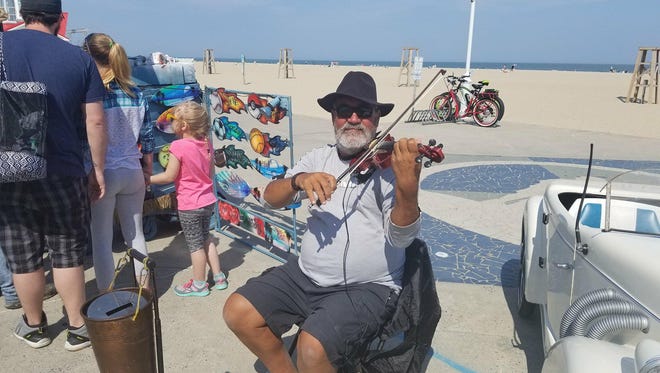Ocean City Boardwalk performer restrictions deemed unconstitutional
 Gray Hughes
Gray Hughes
Ocean City Boardwalk performers expressed a feeling of relief this weekend after a recent court decision removed some restrictions on the famed wooden planks.
Performers will no longer have to sign up for spaces on the Boardwalk a week in advance, a law performers have long protested, Judge Richard D. Bennett ruled in the U.S. District Court of Maryland.
The decision also removed the restriction that performers must work in dedicated areas between South First Street and Ninth Street. Performances before 10 a.m. on the entire Boardwalk, signage or advertising and umbrellas are now OK.
"We made it happen," said Lucian Ionescu, who plays the electric violin on the Boardwalk. "Our Constitutional rights cannot be put on the table as chips. We are American citizens, not Palestinians, and they were treating this like the Gaza Strip with the restrictions."
Tony Christ and six others filed the suit in 2015 against the town.
In his decision, Bennett said the court recognizes Ocean City's "substantial interests" in making the Boardwalk a safe and orderly place for visitors.
Ocean City's restrictions put a "substantial burden" on speech that was not a detriment to the town, according to the decision.
"Ocean City must determine the forms of expressive activities that 'actually harm or substantially threaten' the City’s interests and 'develop an ordinance which directly addresses the evil posed by each activity,' " the decision read.
Ocean City can still enforce three of the regulations that were brought to court. Performances are banned after 1 a.m. and at any time on the street ends of North Division Street and Dorchester Street, and items bigger than 6 feet above the ground are banned.

Ocean City Town Solicitor Guy Ayres said he has not had a chance to discuss the case with the Ocean City Town Council, and he is unsure of whether they will pursue an appeal of the decision.
"I can only say I don’t particularity agree with the decision," he said. "I don’t know what my personal legal opinion would add to the mix."
Ayres said he could not discuss the case any further until after he discusses it with the Town Council.
Now that a verdict has been handed down, there is a sense that justice was served, said David Wright, an attorney with Kahn, Smith and Collins, the law group that represented the Boardwalk performers.
"All of these performers were performers who recognized the First Amendment does not allow a town or municipality to put a performer in a little box," he said. "What we had here was the First Amendment allows for legitimate problems to be solved in legitimate and narrow ways."
There needs to be legitimate justifications for First Amendment restrictions, he said, which the court said the town failed to meet.
Now, Wright and Ocean City are working together to ensure the court's decision is appropriately implemented, Wright said.
Background: Ocean City street performers fight for place on boardwalk
Some Boardwalk performers, though, are still wary.
William Campion wears a Mad Hatter hat and ties balloon animals on the Boardwalk.
While relieved that most of the restrictions have been lifted, he said the amount of money he makes on the Boardwalk has gone down greatly.
Background: Fiddle quibble cripples speech, OC's boardwalk hams say
"What has happened, they hurt us financially," he said. "I used to do three to four hours of tying balloon animals. Now it takes me two days to make the same money I used to make in that time. I've been outside since 8 a.m., it's 3:30 p.m. now, and I've only made $22."

Wright said he hasn't yet heard of any plans to appeal.
"Quite frankly, we are making sure we all understand what the judge ordered and how that impacts the rights of performers," he said. "It seem simple, but it’s a 45 page decision."
Both sides are working together, he added, to ensure there is no conflict between the two parties.
More:Dumser's on Ocean City Boardwalk remains open as legal battle rages on
Wright was aided by Adam Holofcener, executive director of Maryland Volunteer Lawyers for the Arts, a nonprofit providing Pro Bono representation to those involved in the arts.
The Maryland Volunteer Lawyers for the Arts was approached to represent the Boardwalk performers, said Wright, who also serves as the president of the nonprofit.

The dispute began with a 2011 court case between spray paint artist Mark Chase and the town. The ordinance — intended to limit street performers to ends of streets, as well as ban all sales of artistic works — was found to be a violation of Chase's First Amendment right.
In 2013, a second case between violinist William Hassay and the town argued that the "30 foot" ordinance rule for sound violations stands as a breach of First Amendment rights, and the courts agreed.
On Twitter @hughesg19